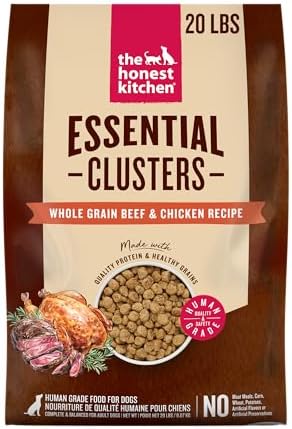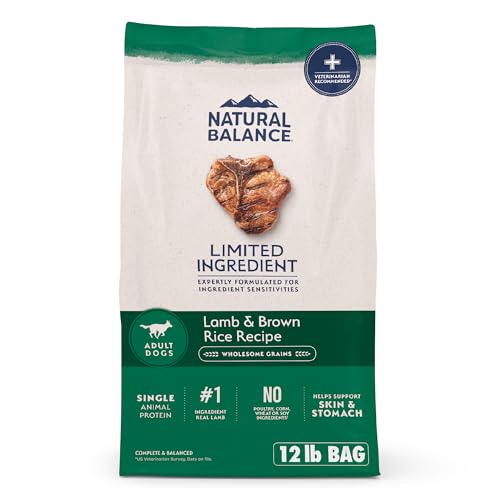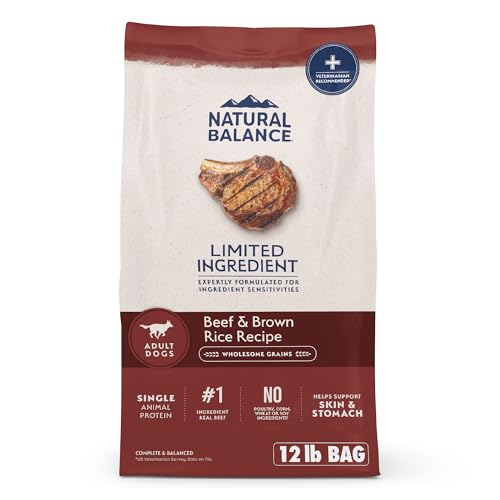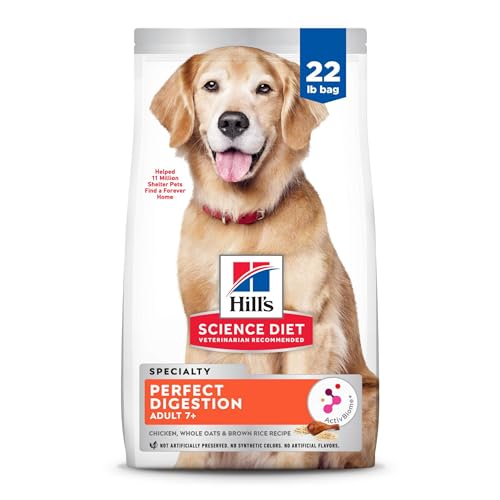If you’re reading this, chances are you share your life with a happy-go-lucky golden angel. Golden Retrievers bring so much joy into our homes, and in return, we want to give them the absolute best. But when you’re standing in a pet food aisle with hundreds of options, finding the best food for golden retrievers can feel like a daunting task.
This comprehensive guide is here to be your trusted friend, cutting through the noise and helping you confidently choose a diet that doesn’t just feed your dog, but helps them thrive for years to come.
Our Top Picks at a Glance
| Product | Best For | Key Feature | CTA |
| Purina Pro Plan Large Breed | Overall Health | AAFCO Feeding Trials | Check Price on Amazon |
| The Honest Kitchen Chicken Recipe | Fresh Ingredients | Human-Grade Quality | Check Price on Amazon |
| Natural Balance L.I.D. Lamb | Whole-Food Nutrition | Human-Grade Dehydrated | Check Price on Amazon |
| Royal Canin Golden Retriever Puppy | Puppies | Safe Orthopedic Growth | Check Price on Amazon |
| Hill’s Science Diet Large Breed | Seniors & Joints | Therapeutic Joint Support | Check Price on Amazon |
Why Your Golden Retriever’s Diet is Foundational Healthcare
Welcome to the wonderful world of being a Golden Retriever parent! Owning one of these cheerful companions is a joy, but it comes with a significant responsibility, especially when it comes to their nutrition. A generic approach isn’t enough; a proper golden retriever diet is a foundational pillar of preventative healthcare.
This breed is genetically predisposed to certain health challenges where nutrition plays a key role:
- Joint and Bone Issues: Conditions like hip and elbow dysplasia are common.
- Heart Health: They have a noted susceptibility to certain cardiac conditions.
- Skin Sensitivities: Many Goldens suffer from allergies and skin issues.
- High Cancer Risk: Tragically, Goldens have a very high rate of cancer.
The goal isn’t just to feed them, but to provide a healthy dog food for golden retrievers that actively contributes to a long, vibrant life.
Deep Dive: The Core Nutritional Needs of a Golden Retriever
To choose the best food, it’s essential to understand what your Golden’s body needs to function optimally.
- High-Quality Protein: Protein is the building block of life, essential for muscle repair, immune function, and healthy skin and coat. Look for animal-based proteins like chicken, lamb, fish, and beef as primary ingredients. These are more “bioavailable” than plant-based proteins, meaning your dog’s body can use them more efficiently. An adult Golden generally thrives on a diet with 18-25% protein.
- Healthy Fats and Omega Fatty Acids: Fats are a crucial energy source and are vital for brain function and absorbing certain vitamins. Specifically, Omega-3 fatty acids (like EPA and DHA, often from fish oil) are anti-inflammatory and critical for joint health, skin integrity, and cognitive function. Omega-6 fatty acids (from chicken fat or vegetable oils) are important for a healthy coat. The balance between these two is key.
- Digestible Carbohydrates: Carbs have gotten a bad rap, but they are an excellent source of energy. The key is quality. Look for complex carbohydrates like brown rice, barley, oats, and sweet potatoes. These provide sustained energy and fiber for healthy digestion.
- Essential Vitamins and Minerals: A “complete and balanced” food will have all the necessary micronutrients. For Goldens, key supplements to look for include:
- Glucosamine and Chondroitin: These compounds are superstars for joint health, helping to maintain cartilage.
- Antioxidants (Vitamin E & C): These help support a robust immune system.
- Calcium and Phosphorus: Vital for bone health, the ratio between these two is especially critical during puppyhood.
Nutritional Needs Across Life Stages: A Detailed Breakdown
A Golden Retriever’s dietary requirements change dramatically as they age.
- The Puppy Stage (Up to 18-24 months): This is the most critical phase for long-term health. The goal is slow, steady growth to prevent developmental orthopedic diseases. A specific golden retriever puppy food for large breeds is non-negotiable. Look for protein content between 22-28% and a precisely controlled calcium-to-phosphorus ratio to ensure their bones don’t grow too quickly. DHA is also crucial for brain and eye development.
- The Adult Stage (2-7 years): During their prime years, the focus shifts to maintenance. You need to provide enough calories to fuel their activity level without causing weight gain, which puts immense stress on their joints. The right golden retriever diet for an adult will have high-quality protein to maintain lean muscle and balanced nutrients for overall health.
- The Senior Stage (7+ years): As Goldens age, their metabolism slows down, and they become more prone to weight gain. Their senior diet should be lower in calories but still rich in high-quality, easily digestible protein to prevent muscle loss. Joint support from glucosamine and chondroitin becomes even more critical. Some senior foods also include antioxidants to support aging immune systems and brain health.
Common Allergies and Food Sensitivities in Golden Retrievers
Many Goldens suffer from food allergies or sensitivities that can cause significant discomfort. Understanding this can help you choose the right food.
- Common Culprits: The most frequent triggers are proteins, including beef, chicken, dairy, and sometimes wheat, corn, or soy.
- Telltale Signs: Symptoms often manifest on the skin. Look for excessive itching, constant paw licking, hot spots, chronic ear infections, or red, irritated skin. Gastrointestinal issues like gas or loose stools can also be a sign.
- What You Can Do: If you suspect an allergy, consult your vet. They may recommend an “elimination diet,” where you feed your dog a novel protein (one they’ve never had before, like lamb or venison) for 8-12 weeks to see if symptoms improve. Limited Ingredient Diets (L.I.D.) are specifically designed for this purpose.
How to Read a Dog Food Label: A 3-Step Cheat Sheet
Navigating the pet food aisle is confusing. Learning to decipher the label is the most powerful skill you can have.
Step 1: Scan the First 5 Ingredients
Look for a high-quality, named animal protein as the first ingredient. Be wary of vague terms.
Step 2: Check the Guaranteed Analysis
For adult Goldens, look for protein between 18-25%. For puppies, aim for 22-28%.
Step 3: Find the AAFCO Statement (The Gold Standard)
A statement reading “Animal feeding tests using AAFCO procedures substantiate…” is the gold standard. It means the food was rigorously tested on real dogs.
The DCM Warning: A Critical Alert for Golden Owners
A serious heart disease called diet-associated dilated cardiomyopathy (DCM) is a major concern. The FDA has found a strong link between DCM and “BEG” (Boutique, Exotic, Grain-Free) diets, which are often high in peas, lentils, and potatoes. When considering what to feed a golden retriever, the safest course is to avoid diets where these ingredients are listed in the top 5-7 positions.
Our 5 Picks for the Best Food for Golden Retrievers
Based on our research, here are our top-tier choices that address the breed’s unique needs.
Just so you know: As a dedicated dog owner myself, I only recommend products I truly believe in. If you purchase through a link on this page, I may earn a small commission that helps me create more in-depth guides like this—at no extra cost to you. I really appreciate your support!
(Learn More)
1. Best Overall: Purina Pro Plan Large Breed Shredded Blend
“A quick note: Prices on Amazon can change daily. Please click the product links for the most up-to-date pricing.“
Why We Chose It: This food is our benchmark for high-quality adult kibble because it’s founded on decades of scientific research and, most importantly, has been validated through extensive AAFCO feeding trials. It directly addresses the needs of an adult Golden by using a grain-inclusive formula, avoiding ingredients linked to DCM, and including guaranteed levels of glucosamine and EPA for proactive joint support and live probiotics to aid digestion.
- Pros:
- Validated by AAFCO feeding trials (the gold standard).
- Includes glucosamine and EPA for proactive joint support.
- Contains live probiotics to aid digestive health.
- Made by a company with extensive nutritional research.
- Cons:
- Contains common allergens like chicken and wheat.
- Not a limited-ingredient formula.
2. Best Dehydrated Option: The Honest Kitchen Whole Grain Chicken Recipe
“A quick note: Prices on Amazon can change daily. Please click the product links for the most up-to-date pricing.“
Why We Chose It: The Honest Kitchen pioneered the human-grade pet food category and offers a unique bridge between kibble and fresh-cooked diets. This recipe is our top choice for owners seeking the nutritional benefits of whole foods with the convenience of pantry storage. The ingredients are finely diced and dehydrated to preserve nutrients, creating a dense, healthy meal once rehydrated. It’s an excellent, minimally-processed choice that is AAFCO complete and balanced for all life stages.
- Pros:
- Made with 100% human-grade ingredients in a human-food facility.
- Minimally processed (dehydrated) to retain more nutrients.
- Shelf-stable and lightweight, no freezer space needed.
- Highly palatable and digestible for many dogs.
- Cons:
- Requires preparation time (mixing with warm water and waiting).
- Texture can be unusual for dogs accustomed to kibble.
- More expensive than traditional dry food.
3. Best for Sensitivities: Natural Balance L.I.D. Lamb & Brown Rice
“A quick note: Prices on Amazon can change daily. Please click the product links for the most up-to-date pricing.“
Why We Chose It: This Limited Ingredient Diet (L.I.D.) is an excellent choice for managing suspected food sensitivities. By using a single novel animal protein (lamb) and a single digestible carbohydrate (brown rice), it minimizes exposure to common allergens. The formula is grain-inclusive and fortified with taurine to support heart health, making it ideal for an elimination trial under your vet’s guidance.
- Pros:
- Novel protein (lamb) is great for dogs with chicken or beef allergies.
- Simple formula with a single carbohydrate source (brown rice).
- Grain-inclusive and fortified with taurine for heart health.
- Cons:
- Lower protein percentage than some other options.
- Some dogs may not enjoy the taste of lamb.
4. Best for Puppies: Royal Canin Golden Retriever Puppy
- BREED HEALTH DOG FOOD: Royal Canin Breed Health Nutrition Golden Retriever Puppy Dog Food Dry Formula for purebred Golde…
- CRUNCHY KIBBLE: Specialized kibble shape and texture designed for a Golden Retriever puppy’s straight muzzle and scissor…
- IMMUNE SYSTEM SUPPORT: Antioxidants and vitamin E help support healthy development of your puppy’s immune system
“A quick note: Prices on Amazon can change daily. Please click the product links for the most up-to-date pricing.“
Why We Chose It: This is the best golden retriever puppy food because it is specifically engineered for their unique developmental needs. Its greatest strength is the meticulously controlled levels of calories, calcium, and phosphorus, which promotes a slow, steady growth rate to help prevent developmental joint diseases. It is also fortified with antioxidants, prebiotics, and essential nutrients like EPA and DHA.
- Pros:
- Precisely calibrated minerals for safe orthopedic growth.
- Fortified with antioxidants and prebiotics for immune support.
- Kibble shape is designed specifically for a Golden Retriever’s muzzle.
- Cons:
- Contains chicken by-product meal, which some owners prefer to avoid.
- Uses corn and wheat gluten as primary ingredients.
5. Best for Seniors & Joints: Hill’s Science Diet Large Breed Adult
“A quick note: Prices on Amazon can change daily. Please click the product links for the most up-to-date pricing.“
Why We Chose It: Hill’s is a brand built on a foundation of scientific research, and this formula is perfect for the challenges facing aging Goldens. It has a moderate calorie content for a slower metabolism, while high-quality protein helps maintain lean muscle. Most importantly, it is fortified with natural sources of glucosamine and chondroitin at levels clinically shown to support joint cartilage and mobility.
- Pros:
- Contains therapeutic levels of glucosamine and chondroitin.
- Moderate calorie count to help prevent age-related weight gain.
- High-quality protein maintains lean muscle in senior dogs.
- Made by a company with a strong foundation in scientific research.
- Cons:
- Not specifically formulated for seniors, but well-suited for their needs.
- Uses barley, which may not be ideal for all dogs.
Homemade Diets vs. Commercial Kibble: A Fair Comparison
Many dedicated owners wonder about homemade diets. Here’s what you need to know.
- Commercial Food: The biggest pro is that it’s formulated to be nutritionally complete and balanced according to AAFCO standards. It’s convenient and backed by science. The con is less control over ingredient sourcing.
- Homemade Food: The main advantage is total control over every ingredient, which is excellent for dogs with severe or multiple allergies. However, the risk is extremely high. It is incredibly difficult to create a diet that is properly balanced in over 40 essential nutrients. Long-term feeding of an imbalanced homemade diet can lead to serious health problems.
Verdict: For the vast majority of owners, a high-quality commercial diet is the safest and most reliable choice. If you are determined to feed a homemade diet, it is absolutely essential that you do so only under the guidance of a board-certified veterinary nutritionist to create a custom, balanced recipe.
Frequently Asked Questions (FAQs)
1. Should my Golden Retriever eat a grain-free diet?
No. Given the link to DCM, veterinarians overwhelmingly recommend a grain-inclusive golden retriever diet.
2. What is the most important nutrient?
High-quality animal protein is the single most critical nutrient.
3. How do I know if my Golden is at a healthy weight?
Use the Body Condition Score (BCS). You should be able to feel their ribs and see a defined waist.
4. What should I feed my puppy?
The right golden retriever puppy food is crucial. Use a large-breed puppy formula designed for controlled growth.
The Final Word on Your Golden’s Food
Choosing the right diet is one of the most significant decisions you’ll make. When deciding what to feed a golden retriever, remember these key pillars: keep them lean, choose science over trends, and trust in foods validated by AAFCO feeding trials.
By combining the knowledge in this guide with professional veterinary care, you are making a lifelong commitment to finding the best food for golden retrievers, because it’s what this magnificent breed truly deserves.
Send Us a Message
For all other inquiries, please use the form below. We look forward to hearing from you!











